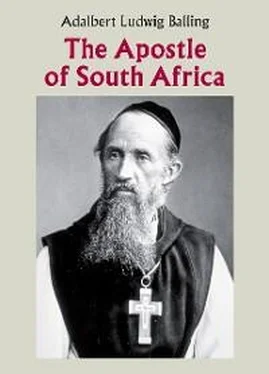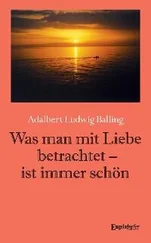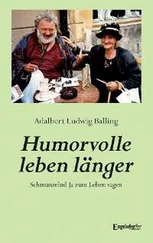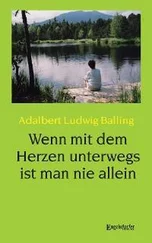One early morning when the sun was just up, Wendel was to drive a two-horse wagonload of sand to the mill. He failed miserably, as the wagon overturned and the sand was spilled. His father, watching him closely, ran up and snarled: “You will never be a farmer! I give you just one more chance: Try your luck in the saw mill! If you fail again, you will study!”
Studying in Feldkirch and Innsbruck
Abbot Francis relates that very early on Michaelmas Day (29 September 1838) his father came into the bedroom which he shared with his twin brother and shouted for him to get up!
“Wendelin! You must go to Feldkirch to study!” – I was awake immediately. On this morning, I put on a new student’s coat instead of my short jacket and exchanged my coarsely sewn and heavily cleated boots with a fine pair of thin leather shoes made for town. Thus duly apparelled, someone completed my outfit by shoving a fire red umbrella under my arm. When my father dipped his fingers into the Holy Water font by the door I did the same, but I remember that I did not know why my stepmother was crying and telling me to be good. – Once we reached the highway, my father pulled out his beads and on this beautiful morning we said a whole Psalter (15 decades) in turns. Later, we boarded a nice horse drawn omnibus which brought us to Feldkirch, City of the Muses … When my father left to return home, the only thing he said to me was: ‘Pray always and study hard’!”
Wendelin was soon known all over Feldkirch on account of his red hair. His record in the 1838/39 school registry is evidence of a good head: “Wendelin Pfanner – Conduct: Excellent; Social Studies, Religious Knowledge, Latin, Geography and History: Very Good; Arithmetic: satisfactory.” Because his first lodging was rather primitive, his godfather, now a parish priest, hired better quarters for him “at the house of two elderly ladies”. He attended daily Mass at the Capuchins’. However, after two and a half years he and a friend took up quarters with a lady and her two daughters who also boarded other students. With them he undertook hikes and weekend excursions. One evening, he found the front door at his landlady’s already locked. How could he get to his room without waking her? He quickly found a way: Making a desperate attempt to climb the leaning wall at the back of the house, he reached the open window of his room, jumped in and landed with not too much of a thud on the floor – only to find the landlady already standing in the door, shaking her head at him and saying but one word: “So, that’s how it’s done, eh?” He wished the floor had opened under his feet. Unable to utter a single word, he vowed to himself never to get into any more misconduct.
Later, a school friend remembered: “Wendelin and I had a room at Rev. Professor Wegeler’s. But after seeing under what circumstances the snuffing lady cook in the kitchen prepared our favourite dishes, we decided to leave the place as soon as the year was over.”
Wendelin spent his vacations at home, giving a hand with the work in the farm, woods, fields and sawmill. It was good exercise for him and a lot of fun besides teaching him many useful skills, as he gratefully remembered in later years.
At the end of September 1844, he and some of his classmates transferred to the Gymnasium in Innsbruck, the capital of Tyrol. The way there led across the Bavarian Allgau by way of Staufen, Immenstadt and Sonthofen (“Where my father bought our excellent Allgau bulls”) to Reutte in the Lech Valley. It was a journey which the Founder vividly remembered in 1901, when he was seventy-six years old:
“All my travels from Bregenz to Innsbruck and back were across mountains and hunchbacked hills … I remember that once on a late afternoon we got caught in a dense fog and suddenly found ourselves on the edge of a cliff over which a swift brook cascaded downward. The fog had lifted just enough for us to see the horrible depth to which this brook plunged. To add to our predicament, we had a classmate with us who was shortsighted and terribly frightened. Seeing the poor fellow quaking in his boots, I said to him: ‘If you care to entrust yourself to me, I will carry you down!’ He agreed, though very reluctantly. Quickly therefore, before he could change his mind, I swung him like a sheaf under my left arm and dragged him down – like a cat, her kittens – while with my right hand I groped down the sharp rocks. He closed his eyes, screamed and prayed but, thank God, did not resist. We made it down! Laying him on the grass, I ordered him to open his eyes and stand on his feet.”
Philosophical Studies in Innsbruck and Padua
In Innsbruck, Wendelin had excellent professors, all Jesuits. He studied Philosophy and graduated with honours. His final certificate, issued 31 July 1845, confirmed his “great diligence” in all subjects except Latin Philology, in which he managed a mere “diligent”. In Innsbruck he attended the daily Eucharist at the Chapel Royal “in the presence (portraits) of Emperor Maximilian and his iron clad ancestors”. Not long after he returned from his vacation for third-semester Philosophy, three of his classmates came to say good-bye. They were on their way to Padua to complete the semester at that famous university. Wendelin was much enticed but lacked the necessary funds to join them. Well, they said: “Volenti nil difficile! (Nothing is difficult for the determined.). They were right! In no time he found a family friend who was working in Innsbruck to lend him traveling fare and a little more. He instructed him to send the bill to his father and gave him a handwritten note to enclose with it saying that he, Wendelin, had gone to Padua for further studies.
That problem solved, he turned his face to the south – anxious with expectation. At the crack of dawn the following day the adventurers were gone, but not before Wendelin had left three guilders for his landlady and a farewell note: “Adieu! Here is my rent for the month; I am off to Italy!” Neither he nor his companions had visited Italy before, but they were willing to take a risk. Entrusting their luggage to a carrier, they hiked across the Brenner as far as Brixen and from there made their way to Italy by pay coach.
It was customary for Padua students to wear top hats, black tailcoats and, in that year, 1846, a “Pio-Nono-Beard”. 4Class conscious dandies strutted about the city in polished boots and, a Havana between their teeth, swung their “stylish swaggering canes”. The casual Mediterranean rhythm determined the life of the signori. “Most days the professors lectured to half empty benches … All we did in Philology was to translate ten pages of a Latin author into Italian.” Sometimes the “northern lights” from Vorarlberg were the only students attending demonstration classes in the theatre. They changed quarters several times and for different reasons, but in one place it was the landlady who complained that their hobnailed boots scratched up the marble floor of her pensione . Things were not exactly as they had expected; yet Padua did have its redeeming grace.
Abbot Francis:
“Though I came to Padua undecided about my career, I knew after one month that I would be a priest. As I observed the behaviour of the Italian students and got to know firsthand how depraved many of them were, no other but the celibate life held any more attraction for me. From that moment my eyes were set on Brixen, my bishop’s residence and the place of the diocesan seminary of Tyrol.”5
Padua had nothing further to offer to the Vorarlbergers. Though derided as “barbarians!” and “potato eaters!” their final certificates were the best the professors issued that year. They departed as quickly as possible, taking the train to Verona and continuing by coach to Lake Garda and Milan via Pavia. The last leg was done again by train as far as Lake Como. From there they went on foot across the Spluegen Pass and by mail coach past Liechtenstein to Feldkirch. At Langen-Hub, father and siblings were just bringing in the hay when Wendelin walked in the door. Happy to be home again, he willingly gave a hand. In fact, he spent his entire vacation, not with books, but with rake and pitchfork!
Читать дальше












